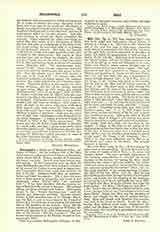

Heli (Heb. `LY, Gr. ‚ÄòEli, Prot. versions ELI).—(A) was both judge and high-priest, whose history is related in I Kings, i—iv. He lived at Silo, where the ark of the Lord was kept at that time. Samuel’s early history is connected with that of the last days of the aged Heli, whom he succeeded in the office of judge, just before the appointment of Saul as king (I Kings, vii, 15; viii, 22). Heli must have been held in the highest esteem, and yet the Bible represents him to us in his old age as weak and indulgent to his sons, Ophni and Phinees, whose crimes brought ruin on their country and on their father’s house. The high-priesthood had been promised to Phinees, son of Eleazar and grandson of Aaron, for his zeal (Num., xxv, 13); and how Heli, who was a descendant of Aaron through Ithamar (Lev., x, 12; I Par., xxiv, 2; III Kings, ii, 27), became high-priest is not known; but his title to the office had the Divine sanction (I Kings, ii, 30). The Lord spoke to Heli through the boy Samuel, and the word of the Lord was fulfilled. The Philistines were victorious in battle, Ophni and Phinees being among the slain, and the ark was carried away as a part of the spoils. The death of the high-priest is thus described “Now Heli was ninety and eight years old … he fell from his stool backwards by the door, and broke his neck, and died” (I Kings, iv, 15-18). According to the Heb. text, with which Josephus agrees (Ant., V, xi, 3), Heli judged Israel forty years, so that the twenty of the Gr. text is generally considered an error. Heli spoke when he should have been silent (I Kings, i, 14), and he was silent when he should have spoken and corrected his children. The words “And thou shalt see thy rival in the temple” (I Kings, ii, 32) refer to the taking of the high-priesthood from his family; but as this was done in the days of Solomon, more than a hundred years later, for he “cast out Abiathar, from being the priest of the Lord” (III Kings, ii, 27; Josephus, “Ant.”, VIII, i, 3), they were addressed, not to Heli as an individual, but rather to his house. The passage however is obscure.
HELI (Gr.‚ÄòElei—Luke, iii, 23).—(B) is evidently the same name as the preceding. In Luke he is said to be the father of Joseph, while in Matt., i, 16, Jacob was Joseph‘s father. The most probable explanation of this seeming contradiction is afforded by having recourse to the levirate law among the Jews, which prescribes that when a man dies childless his widow “shall not marry to another: but his brother shall take her, and raise up seed for his brother” (Deut., xxv, 5). The child, therefore, of the second marriage is legally the child of the first (Deut., xxv, 6). Heli having died childless, his widow became the wife of his brother Jacob, and Joseph was the offspring of the marriage, by nature the son of Jacob, but legally the son of Heli. It is likely that Matt. gives the natural, and Luke the legal descent. (Cf. Maas, “The Gosp. acc. to S. Matt.”, i, 16.) Lord A. Hervey, Bishop of Bath and Wells, who wrote a learned work on the “Genealogies of Our Lord Jesus Christ“, thinks that Mary was the daughter of Jacob, and Joseph was the son of Jacob‘s brother, Heli. Mary and Joseph were therefore first cousins, and both of the house of David. Jacob, the elder, having died without male issue, transmitted his rights and privileges to the male issue of his brother Heli, Joseph, who according to genealogical usage was his descendant.
JOHN J. TIERNEY

